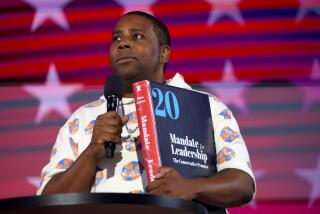U.S. Judges Drop Support of Task Force on Race, Gender Bias
WASHINGTON â The Republican-appointed majority on the U.S. Court of Appeals in the District of Columbia has denounced the work of a task force looking into race and gender bias in the federal courts and voted last Friday to withdraw its support for the project.
Three appeals judges--Stephen F. Williams, Laurence H. Silberman and Douglas H. Ginsburg--led the challenge, assailing a task force committee on gender that is looking into a wide range of issues, including how many women are hired as law clerks by federal judges, according to internal court memos and interviews.
The battle has been fought in a flurry of judgesâ memos, shooting back and forth between critics and supporters of the Task Force on Gender, Race and Ethnicity. Williams fired the first salvo in a memo Feb. 7, and later called on the 10-member court to vote that it âno longer has confidenceâ in the task force.
In an interview Saturday, Chief Judge Abner J. Mikva said the court majorityâs denouncement of such the project was âunfortunate,â but would have no effect on the task forceâs future.
âWe canât allow them to have a hecklerâs veto and not go ahead,â he said. The project involves both the appeals and trial courts.
It is part of a nationwide effort to determine whether female lawyers, court employees, defendants and women involved in lawsuits face bias in the profession or the court system.
In his Feb. 7 memo, Williams challenged much of the focus of the committee looking at gender issues. For example, he objected to questions about whether gender affects law firm assignments on federal cases because they delve into the actions of the private bar.
Williams also suggested that the task force âproceed warilyâ with questions about the hiring of law clerks, noting that judges consider those decisions as âtightly tiedâ to their constitutionally guaranteed independence.
More to Read
Get the L.A. Times Politics newsletter
Deeply reported insights into legislation, politics and policy from Sacramento, Washington and beyond. In your inbox three times per week.
You may occasionally receive promotional content from the Los Angeles Times.










